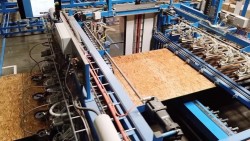Katerra Inc, the company set up in 2015 to revolutionise construction with a tech-driven approach to timber prefabrication, has filed for relief under Chapter 11 of the US Bankruptcy Code.
A statement published
on the company's website yesterday said: "The rapid deterioration of
the company's financial position is the result of the macroeconomic
effects of the COVID-19 pandemic on the construction industry, inability
to procure bonding for construction projects following the unexpected
insolvency proceedings of Katerra's former lender, and unsuccessful
attempts to secure additional capital and business."
The lender
referred to is thought to be Greensill Capital, the supply chain finance
giant that filed for insolvency in March, and which had channelled
funds to Katerra from Softbank, as reported by the Financial Times.
Katerra and Greensill were both heavily backed by SoftBank.
Marc
Liebman, Katerra's chief transformation officer, said: "We are
implementing initiatives on multiple fronts to maximise value and
provide the best path forward for Katerra and its many stakeholders.
"Our
multi-step action plan has rapidly evolved and includes consolidating
US activities, continuing our international businesses, advancing key
asset sales, securing debtor-in-possession financing, and commencing an
in-court restructuring process. We are grateful to the extraordinary
ongoing work and support of the Katerra team and other core
constituencies through this extremely difficult time."
It added that the company was proceeding with its overseas business and certain active projects in a number of states.
The
company said it would file motions with the bankruptcy court requesting
authorisation to "continue paying remaining employees, vendors, and
others in the ordinary course of business moving forward".
Katerra
was founded in 2015 by a group of real estate and tech-business
executives. They had a plan to use customised timber modules fabricated
in automated factories to cut production costs and rapidly gain market
share.
Japanese conglomerate SoftBank became the main backer.
Its Vision Fund eventually contributed the lion's share of the $2.2bn
that was raised for Katerra.
Katerra expanded quickly through acquisitions, buying architecture firms as well as conventional contractors in an attempt to rationalise and expand its offering of multi-storey timber office and residential buildings.
Its statement yesterday said some of these acquisitions would be put up for sale.
The company had been showing signs of strain for at least three years. In 2019, it said it would cut 200 jobs and shut down a factory in Phoenix to concentrate production on a more efficient plant in California.
Image: Katerra's Phoenix factory, which closed down in 2019. It had others in Spokane, Washington, and Tracy, California (Katerra)
Original Source: Global Construction Review









